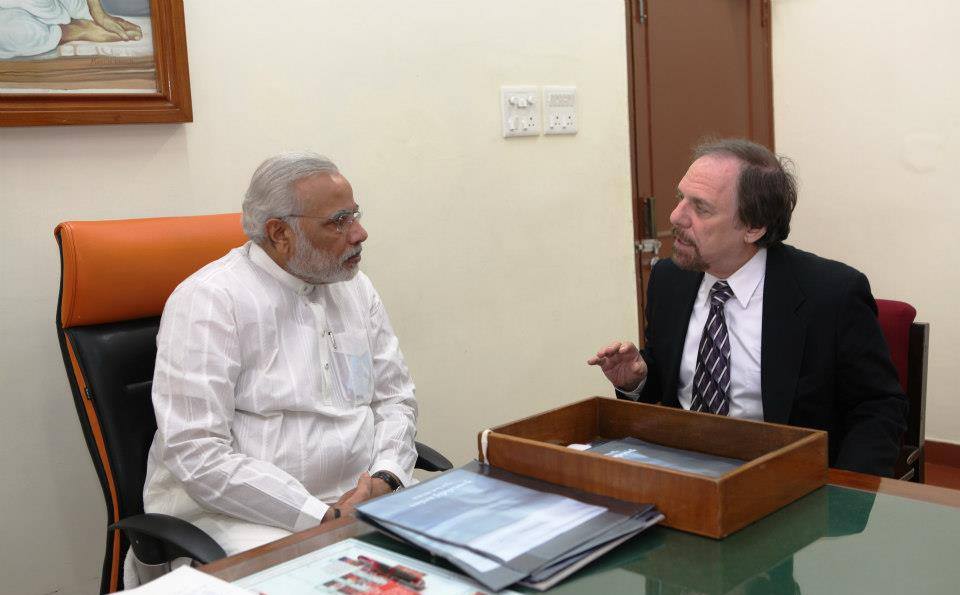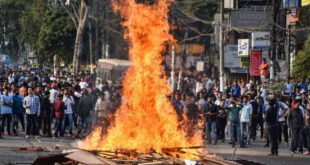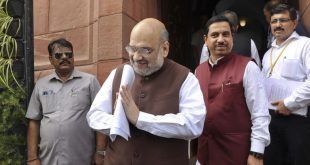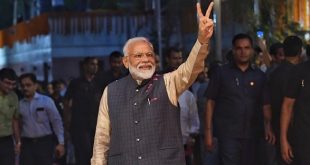In an exclusive interview Dr. Richard Benkin shared his views with Shaurya Ritwik, Founding Editor, The Charticle on his latest published book What is Moderate Islam?, Radical islamic terrorism, Donald Trump administration, his role in advocacy of human rights in Bangladesh and a lot more.
Dr. Benkin, first of all I would like to congratulate you on your new book ‘What is Moderate Islam?’, which I firmly believe to be an important topic the world should address. It was my pleasure to attend the book launch event in New Delhi. It is great that you have taken the initiative to start a discussion in this direction. Kindly let our readers know more about your book. What this book is all about? Is this book exclusively for Muslims or is it significant for Non-Muslims too?
Thank you Shaurya Ritwik, I appreciate your good work as well. The book’s rationale is very straightforward: Radical Islamists are the greatest source of international instability in the 21st century; and we’ve got to defeat them—not understand them, or find a way to live with them; but to defeat them. Yet, we have not developed any strategy for doing so. I believe this is in large part due to censorship or self-censorship of free speech. On the one hand, we cannot continue failing to distinguish between Islam and Radical Islam. Doing so is not only morally wrong, it is factually incorrect and a ridiculous strategy. So is curtailing free speech and closing off your mind because you are afraid of being called “communal” or “racist.” We must ask the tough questions about links between Islam and terrorism.
We also have seen how allowing these extremes of thought at the expense of truth gives people space for the most ridiculous statements, whether the falsehood that all Muslims are jihadis or the equally stupid idea that talking about the link between Islam and terror is somehow being prejudice.
What is Moderate Islam brings together activists and scholars, Muslims and non-Muslims to begin that—often uncomfortable discussion. In fact, that’s what it is: a beginning, one that sparks further open discussion.
There are chapters by and about the Baloch and their practice of Islam in opposition to that of the radicals; Dr. Daniel Pipes has a chapter with a methodology and questions designed to get below the surface for, as he puts it, “smoking out Islamists” and not letting false moderates fool us; there are chapters about Indian Muslims; and chapters about Malaysia and Bangladesh. One Pashtun Muslim writes about his experience in a Taliban madrassa, and in another chapter, I interview a Pashtun woman living in exile.
This book is intended for everyone; in fact, it is critical that Muslims and non-Muslims alike read it and engage in this discussion without limits on free speech or free thought.
There are two streams of thoughts dominating the terrorism scenario currently. First is that Islamic extremists are the flag bearer of terrorism all across globe, due to orthodox theology of Islam; and even a person with an Islamic name is seen as a potential terrorist. Secondly a large section of people believe Muslims to be the biggest victim of terrorism, and they claim Islamophobia is induced by the western world for their political game. They believe ISIS and other terrorist groups are being fuelled by the United States and Israel. Where do you find the truth between these two claims?
First of all, both of those theories are just not true; and anyone who spouts off about either is intellectually lazy and prefers easy answers to correct ones. Why in the world would the United States and Israel want to support ISIS? You would say that only if you are coming from the belief that both are irredeemably evil and coordinated in their actions—which is simply untrue. Challenge anyone who does to come up with good and validated information not rumour and conspiracy theory. Similarly, the only reason to condemn all Muslims is because conducting a real analysis is too difficult for you. I’ve spent enough time on the front lines of this fight to know that there is a difference between radical Islamists and the many Muslims who put their lives in jeopardy fighting for our freedom.
The only way to help people get away from these two simple-minded extremes is to have open dialogue where no one is afraid of being charged with offending anyone else’s sensibilities; or being called communal or racist, or an appeaser. That’s the only way to find the reality between the extremes and develop an effective strategy for victory.

We cannot shy away from the fact that radicalisation of Muslims is going on large scale, and it is first step for Islamic terrorism. How do you suggest checking and neutralising the speedy growth of Wahhabi ideology among Muslims, which teaches that Muslims can never co-exist with infidels unless they convert them, even if they have to do it forcefully?
This is the question of our time. Let us begin by recognising the three factors most responsible for successful Islamist recruitment: (1) the promise of being effective in getting things done, while others are ineffective; (2) providing young people with a sense of purpose; and (3) providing a sense of worth and belongingness to those who feel alienated. So how do we counteract those things? That is our challenge.
(1) I work closely with the Baloch and we frequently talk about this. We believe we have only a limited amount of time to achieve our goals through moderate means. Even now, radicals are trying to attract young Baloch by pointing to the fact that the existing authorities have not been able to re-gain Baloch independence or freedom from Pakistani human right atrocities. We need to support efforts like that of the Baloch so that the youth will see that the “old” ways of doing things are effective, and while it’s easy for Islamists to say what they would do, we have a proven track record. They don’t. We must find the obstacles to effectiveness and get rid of them—disunity due to personal interests, bureaucracy, fear and so on. But we need to do this now or the opportunity will be lost.
(2) I also work with Pashtun. They are experiencing some troubles, however, they feel they can bear them because the struggle for Pashtun freedom from Pakistani occupation gives them a real sense of purpose—to help save their people and bring about a real Pakhtunistan. All of these people are practicing Muslims; most qualify as youth; all have rejected the radical Islamists because they find meaning and expect to be effective without turning to the promise of jihad, which likely will end in their deaths after a short life. They are Muslims who recognise the importance of their national identity over the “Muslim ummah.” These are examples. In this case, national identity and the struggle for it provides meaning.
(3) This is the most difficult challenge. Each of us has a role to play in helping to create societies that are inclusive and that value all of us equally. It’s called democracy, and we know that the society planned by the jihadis is anything but that. Expose it, in articles, individual conversations, and with action. Work for a just society, even if the first step is simply lending a friendly hand to one who is marginalised due to religion, race, sexuality, political views, or anything else.
So, while it’s good question, we need to ask it another way. It’s not how to stop Islamist recruitment, because there’s nothing attractive about the terrible life they offer. Rather, they fill the gap where we have failed: failed to be effective in doing the things we say we must do; failed to provide youth with a meaningful experience that promises a sense of purpose; failed to create a just society because of corruption, bigotry, and placing personal interest above the social good. This is our challenge, and we will meet it one person at a time, one issue at a time.
You have always been an advocate for human rights. Your work in Bangladesh for Hindu minority is exceptional in itself. Can you please elaborate to our readers regarding the ethnic cleansing of Hindus in Bangladesh and your firsthand experience there? Do you feel ethnic cleansing of minorities in Pakistan and Bangladesh are a blot on a modern world that talks of democracy, liberty, and freedom? Is it the perfect example for a failed system of government?
As a Jew growing up in the decades not long after World War II, I learned about the Nazi Holocaust against my people, and continued to study and analyse it in detail. And the more I did, the more I realised that the Nazis were not the problem. Of course, they were terrible people, but they could not do all this alone. Those responsible for the Holocaust were all those “good” Europeans and others who stood by and did nothing while their neighbours were being brutalised and killed. And I swore that I NEVER would be that person and stand by silently, which is why I do what I do.
Of course, Bangladesh is not Nazi Germany, and Sheikh Hasina is not Adolf Hitler. But the lesson is the same. The real blot on humanity is that most people are fine with others being killed so long as they are not. Moreover, we also must remember what the Dalai Lama said: “It is not enough to be compassionate. You must act.” I ask those reading this, “Are you taking action?”
It’s not just a few of us anymore; the ethnic cleansing of Hindus in Bangladesh is now a big issue. I believe as we now hear more voices raised on behalf of the Bangladeshi Hindus, and we are hearing them, the government of Bangladesh will stop allowing this human rights atrocity to occur. But I ask each reader again, “Are you taking action.” What are you doing to help those oppressed?
What is your analysis of the major difference between Former President Barack Obama and President Donald Trump with regard to their government’s commitment to fight against terrorism? President Trump’s election campaign focused primarily on cracking down Islamic terrorism. How do you assess the arms deal between the Trump government and Saudi Arabia, a country accused of being the flag bearer of human rights violations and the financier of Islamic terror outfits?
I believe that both Presidents—and all those who came before them—share a basic approach to international conflicts: defeat when you must, contain when you can; also, go to war only when you must, use other means (sanctions, diplomacy) when you can. In that regard, there is no difference. There certainly is a difference in form; for instance, President Obama would not allow his administration to use the term “radical Islamic terror,” or anything like that. President Trump very prominently uses it, and is more confrontational than conciliatory in his expression.
Trump has made clear that his foreign policy breaks from Obama’s in two critical ways. First, he believes that over the past eight years, actual and potential friends stopped seeing the United States as a reliable ally. The most often cited example was President Obama’s encouragement of Iranian dissidents only to abandon them when they faced the wrath of the mullahs. I can tell you from personal experience that Trump is correct. Friends and foes alike need to know that we will do as we say; and allies like the Iranian dissidents need to know that we will support them when things get tough for them. Trump’s second principle was for the United States to stop making “bad deals”: such as US aid to Pakistan even though it is well known that Pakistan uses the aid to suppress the Baloch, Sindhi, and others; and to attack India. Trump also favours bi-lateral deals between the US and one country at a time, as opposed to multi-lateral deals such as the Paris climate change accord that he pulled out of earlier this year. Focus on these two principles in Trump foreign policy rather than his rhetoric.
Find Us on Twitter: @thecharticle
The accord with Saudi Arabia is much more complicated. First, the Saudis and the Gulf States have formed, along with Egypt, a Sunni alliance to block Iranian imperialism in the Middle East. They even are working with Israel as they now recognise Iran to be a real threat and Israel not one. You also need to think things all the way to their conclusion. The Saudi economy is based entirely on oil, and oil prices have been dropping significantly over the past several years. They will not rise again, except perhaps temporarily during a crisis. Several nations, including India, are moving ahead and developing alternate energy sources, and more sources of fossil fuels are discovered all the time. If Saudi Arabia does not find another basis for its economy, it will experience something close to complete economic collapse, and we can expect civil unrest and perhaps worse. With no democratic traditions in Arab world, we cannot expect a less radical regime to take power; and it is no secret that Iran and its allies are just waiting to pounce on such an opportunity. Thus, supporting Saudi Arabia now might be the only way to prevent a really radical Islamist and aggressively jihadist government from replacing the royal family. There already are signs that the Saudis are moderating.

How do you see future of our world and the future of Islam with all socio-political changes going on? And importantly what role you think India can play in combating Islamic extremism?
The answer to that question will depend, more than anything else, on the internal struggle within Islam. Let us remember that Islam is a religion dating back fourteen centuries,Islamism or radical Islam is a political philosophy dating back less than two. Many Muslims and non-Muslims alike fail to make that distinction sufficiently. To the extent that continues, we will continue to face a struggle both within and without Islam.
Militarily, there is no question that the radicals will lose—eventually; and we want to minimise the death and destruction that occurs until that time. History has shown us that time and again. Even if right now, geopolitical struggles among the United States, Russia, and China interfere with a clear strategy that will change. In World War II, the western democracies made temporary peace with Joseph Stalin to defeat a more immediate threat in Nazi Germany. In the 1980s, the US supported Saddam Hussein in his fight against Iran. And Asian nationalists fighting colonisers allied with tyrannical regimes in China and the Soviet Union, even though almost all became capitalist and democratic once they won their struggles.
India, however, has a unique role to play. Reviewers have commented that the focus on South Asia in What is Moderate Islam is a significant step forward in the debate. Most western analyses focus on the Middle East, which I long held is a side show—a deadly one, but still as side show compared with South Asia where several Islamist groups have been conducting terror and recruitment actions for decades. South Asia has four and a half times as many Muslims as the Middle East and one of every five people on the planet. Especially with the ascension of Narendra Modi as Prime Minister, India is taking its place as both an economic and geopolitical power. With a fifth of its population Muslim, India has by far the world’s largest minority Muslim population. Indian Muslims as a group show a great deal of diversity that can encompass the radical Deobandi School as well as Sultan Shihan’s New Age Islam. Large populations of Hindus from Kashmir, Bangladesh, and territories occupied by Pakistan have found refuge in India; as have large Muslim populations from those same Pakistani-occupied territories. Refugees aside, Indian Hindus and Muslims both play significant roles in the life of the nation, the culture, and the economy. No country has a greater interest in leading the world in distinguishing Muslim friends and neighbours from radical Islamists and those who provide them with support and ideological cover. Neither does any country have as many Muslim and non-Muslim resources to carry on that struggle.
Find Us on Facebook: @thecharticle
If I were to make one friendly recommendation to that great nation of India laws stifling free speech and open inquiry hurt progress. Calling something “communal” does not help enhance understanding or stop the ideas being labeled. Democratic institutions protect us against many evil actions; but they do not protect us from being “offended.” You want me to tell you how frequently my people, the Jews, have our religious sensibilities offended—even at the UN and by those who consider themselves guardians of fairness? But that does not lead us to call for laws muzzling free speech.
So after ‘What is Moderate Islam’ should we be expecting more books from you revolving around the biggest problem the world is facing today, Islamic terrorism? The problem is vast so the ideological battle will be vast too. I hope intellectuals will ponder the questions, issues, and relevance of Moderate Islam raised by you and will wait for many more books to come.
I wrote What is Moderate Islam to begin a very badly needed dialogue and public inquiry. I do not agree with everything each contributor wrote in the book—but that’s okay. The point is to get out all the different ideas and points of view without forcing people to be anything less than completely truthful. So, let us see where this endeavour takes us.
That being said, I am working on ideas for at least two more books. The first is another anthology, this one about the Baloch. There are some chapters in What is Moderate Islam about the Baloch because they are a predominantly Muslim people whose essential principles reject radical Islam; and they have lived by this code. I work closely with the Baloch and feel their struggle to re-gain their independence from Pakistan keenly. Moreover, their primary identity seems to be nation, not religion. As such, they provide an important object lesson for distinguishing between Muslims and jihadis. Their struggle also has consequences for the most important geopolitical elements we face. Right now, I’m trying to gather the right group of Baloch to author individual chapters.
I’m also planning a book with about India’s development. My colleague Amitabh Tripathi would write from the “inside,” that is as an Indian; and I would write from the “outside,” that is as a non- Indian. India sits at the center of the struggle to defeat radical Islamists.
Thank you.
Dr. Richard Benkin is a reputed American Jewish Human rights activist, co-founder of ‘Interfaith Strength’, journalist, writer and lecturer. He’s also a member of Folks Magazine’s Editorial Board.
 The Charticle Asia's top notch digital journalism
The Charticle Asia's top notch digital journalism



